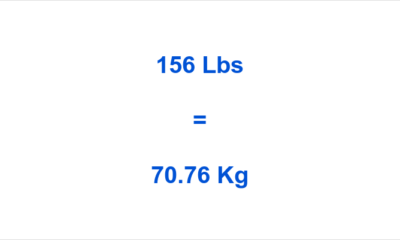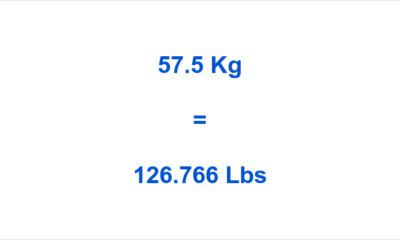CRYPTO
What is 1.08057? A Friendly Guide to Understanding This Mysterious Number

Ever stumbled across the number 1.08057 and thought, “Wait, what even is that?” You’re not alone.
Whether it popped up in a math equation, a finance spreadsheet, or somewhere in the vast wilderness of Google search results, you’re probably here because you want to know what 1.08057 actually means — and fast.
You’ve come to the right place. Let’s break it down in plain English, with a little humor, zero jargon, and a lot of curiosity.
So… What is 1.08057?
Let’s be real — 1.08057 looks like one of those numbers that should mean something. But without context, it’s a bit of a mystery.
Here are a few possible places you might see it:
- Currency exchange rate (maybe between the Euro and the USD?)
- Interest rate or multiplier in finance or economics
- Mathematical constant in a specific formula or equation
- Scientific data point – like density, frequency, or time
- Programming value or version identifier
In short, it’s a floating-point number that probably carries a lot of weight depending on where you found it. But don’t worry, we’ll explore a few of the most common and useful contexts below.
1.08057 in Finance: Is It an Exchange Rate?
One of the most common places people run into a number like 1.08057 is on a currency exchange chart.
Let’s say you’re traveling to Europe and need to exchange dollars for euros. If the exchange rate is 1.08057, that means:
1 Euro = 1.08057 US Dollars
Pretty handy if you’re trying to calculate how much those dreamy croissants in Paris are gonna cost you in USD.
1.08057 as a Growth Multiplier
In business and investing, multipliers like 1.08057 are used all the time.
Let’s say your investment grew by 8.057% over a year. Instead of writing that percentage out, you might use the decimal form — 1.08057 — to show how much the value increased.
For example:
If you started with $1,000 and multiplied it by 1.08057, you’d end up with $1,080.57.
Not bad for a year’s work, right?
1.08057 in Math: Just a Decimal? Maybe More.
On its own, 1.08057 could be just a boring ol’ decimal. But math nerds know better — sometimes a number like this is a rounded-off constant from a longer, irrational number.
For instance:
- It might show up in geometry or trigonometry
- Could be used in a physics formula
- Might be a result of dividing or calculating something specific
Still, without context, it’s like trying to guess a movie from just one screenshot. It could be anything.
Why You Might See It in Code or Tech
In some cases, software developers or engineers use numbers like 1.08057 as configuration settings, version numbers, or thresholds.
Imagine a software update labeled v1.08057 — that tiny decimal could mean a huge difference in what the code does.
TL;DR – What You Need to Know
Here’s a quick cheat sheet:
- Finance? Probably an exchange rate or growth multiplier
- Math? Could be a constant or result of a calculation
- Science? Possibly a measurement (weight, density, etc.)
- Tech? Might be a version number or configuration value
No matter the field, 1.08057 is a number with purpose. You just need to know where to look.
Conclusion
While 1.08057 might seem like just a random string of numbers, it can tell us a lot depending on the context. Whether you’re converting currency, tracking investments, solving equations, or tweaking some code — it’s a good number to know.
And hey, now when someone asks you what 1.08057 means, you can answer with confidence (and maybe a little flair).
FAQs About 1.08057
Q: Is 1.08057 a common exchange rate?
A: It’s pretty close to recent USD/EUR rates, but these change daily. It’s always smart to check the latest numbers!
Q: How do I use 1.08057 to calculate growth?
A: Just multiply your starting value by 1.08057. That shows an 8.057% increase.
Q: Could 1.08057 be a version number?
A: Yep! Especially in tech and software development. Developers often use decimals in versioning.
Q: Is 1.08057 an important math constant?
A: Not exactly a famous one like Pi or Euler’s number, but it could be a rounded result in many equations.
Q: Why does Google show results for 1.08057?
A: Because people search for it! And now, hopefully, they’ll find this blog post and get the answers they need.

CRYPTO
Etherions Faston Crypto: Revolutionizing the Digital Financial Landscape

In the ever-evolving realm of blockchain and digital currency, a new innovation has caught the attention of tech-savvy investors and futurists alike—Etherions Faston Crypto. As digital finance continues to gain momentum, the need for efficient, secure, and scalable solutions becomes increasingly vital. This is precisely where Etherions Faston Crypto makes its mark.
What is Etherions Faston Crypto?
Etherions Faston Crypto refers to a hybrid blockchain technology that merges high-speed transaction capabilities with the secure framework of decentralized finance. Designed to overcome limitations seen in traditional cryptocurrencies like Bitcoin or Ethereum, this system promises lightning-fast confirmations and minimal transaction costs. By integrating smart contract compatibility, it offers a robust platform for decentralized applications (dApps), while maintaining high throughput and scalability.
Key Features of Etherions Faston Crypto
One of the most notable features of Etherions Faston Crypto is its revolutionary consensus mechanism. Unlike the energy-intensive Proof of Work or the often oligarchic Proof of Stake, Faston utilizes a hybrid algorithm that promotes both sustainability and decentralization. Additionally, it supports interoperability, allowing seamless communication with other blockchains, which enhances user flexibility.
Another strength lies in its security architecture. With multi-layer encryption and real-time anomaly detection systems, Etherions Faston Crypto prioritizes safeguarding user assets. Furthermore, its commitment to open-source development ensures transparency and community trust—two pillars critical to any successful crypto ecosystem.
Benefits for Users and Developers
Users of Etherions Faston Crypto enjoy rapid, low-cost transactions, which makes it ideal for everyday micro-payments and global remittances. For developers, the platform offers a scalable environment where dApps can be launched without congestion issues commonly experienced on older networks.
Importantly, the user interface and experience have been thoughtfully designed. With intuitive wallets and decentralized exchange integrations, the barrier to entry is significantly lowered for crypto newcomers.
Why Etherions Faston Crypto Stands Out
While many cryptocurrencies aim to disrupt finance, few succeed in delivering holistic innovation. Etherions Faston Crypto not only provides a novel infrastructure but also empowers financial inclusivity. Its architecture supports tokenization, allowing for real-world assets to be digitized and traded on-chain, thus opening doors for broader participation in the decentralized economy.
Moreover, through a community-led governance model, the future development of the network lies in the hands of its users. This democratic approach fuels trust and ensures that the platform evolves according to real-world needs.
Transitioning to the Future of Crypto
With digital finance evolving at breakneck speed, standing still is no longer an option. Etherions Faston Crypto embodies this momentum by offering a futuristic model that addresses both performance and accessibility. Businesses, developers, and individuals who adopt this technology early are positioning themselves ahead of the curve.
The transition to blockchain-based systems has been met with both enthusiasm and skepticism. However, with technologies like Etherions Faston Crypto leading the charge, the potential to reshape global finance becomes increasingly plausible.
Conclusion: A Paradigm Shift in Digital Currency
To conclude, Etherions Faston Crypto is not just another digital coin—it is a movement toward a more efficient, inclusive, and adaptive financial ecosystem. Its blend of speed, security, and scalability addresses the core challenges that have hindered crypto adoption in the past. With continuous development and growing community support, the platform is poised to lead the next wave of blockchain innovation.
In embracing this change, users and developers alike are not only investing in a currency but in a vision of a decentralized future.
CRYPTO
A Comprehensive Guide to BE1Crypto.com Trading – Learn and Earn

Introduction to BE1Crypto.com Trading
The world of cryptocurrency trading is rapidly evolving, offering new opportunities for investors worldwide. BE1Crypto.com has emerged as one of the prominent platforms, providing a wide range of features for both beginner and advanced traders. This article delves into everything you need to know about BE1Crypto.com trading, from platform benefits to expert trading strategies.
What is BE1Crypto.com?
BE1Crypto.com is a cutting-edge cryptocurrency exchange designed to cater to the needs of modern traders. The platform offers a user-friendly interface, robust security measures, and an extensive selection of digital currencies to trade. Whether you’re looking to trade Bitcoin, Ethereum, or lesser-known altcoins, BE1Crypto.com provides access to all.
Key Features of BE1Crypto.com
1. Wide Range of Cryptocurrencies
One of the standout features of BE1Crypto.com trading is its diverse selection of cryptocurrencies. Traders can access major coins like Bitcoin (BTC) and Ethereum (ETH), as well as a variety of altcoins. This wide range allows users to diversify their portfolios and explore emerging tokens with potential for high returns.
2. User-Friendly Interface
The platform’s intuitive design makes it easy for even novice traders to navigate. With clear options and tools, traders can easily monitor their portfolios, execute trades, and stay updated on market trends.
3. Advanced Trading Tools
For more experienced traders, BE1Crypto.com offers advanced tools like margin trading and automated bots. These tools enable users to manage risks and optimize their trades, helping them stay ahead in the volatile crypto market.
4. Strong Security Measures
Security is paramount in the crypto world, and BE1Crypto.com has implemented several layers of protection to ensure the safety of user funds. From two-factor authentication (2FA) to encryption protocols, the platform prioritizes the security of its users.
How to Start Trading on BE1Crypto.com
1. Create an Account
To begin your trading journey on BE1Crypto.com, the first step is to create an account. This requires providing basic details like your name, email, and proof of identity for verification purposes. Once your account is set up, you can deposit funds and begin trading.
2. Deposit Funds
BE1Crypto.com supports multiple payment methods, including bank transfers and digital wallets. After depositing funds, you can start buying your preferred cryptocurrencies. The platform supports both fiat currencies and digital assets for seamless transactions.
3. Choose Your Trading Pair
Once your account is funded, it’s time to choose your trading pair. BE1Crypto.com offers a variety of trading pairs, allowing you to trade one cryptocurrency for another or exchange cryptocurrencies for fiat money.
4. Execute Your Trades
Using the trading interface, you can execute your buy or sell orders. BE1Crypto.com offers several order types, including market orders, limit orders, and stop-loss orders, giving you greater control over your trades.
Tips for Successful Trading on BE1Crypto.com
1. Stay Informed with Market Trends
Cryptocurrency markets are notoriously volatile, making it essential for traders to stay informed. BE1Crypto.com provides live market data, including price charts and analysis tools, so you can make informed trading decisions.
2. Start Small
For beginners, it’s recommended to start with a small investment. This allows you to get familiar with the platform and its features without risking large sums of money. As you gain more experience, you can increase your trading volume.
3. Utilize Advanced Trading Tools
Advanced traders should take advantage of BE1Crypto.com’s margin trading and trading bots. These tools can help automate trading strategies and optimize returns by leveraging market movements to your advantage.
4. Practice Risk Management
Always practice good risk management. Set stop-loss orders to protect your investments from large market swings, and never invest more than you can afford to lose.
Conclusion
BE1Crypto.com trading offers a range of opportunities for both new and experienced crypto traders. With its extensive features, easy-to-use interface, and strong security measures, the platform provides everything needed for successful cryptocurrency trading. Whether you’re looking to trade popular coins or explore emerging altcoins, BE1Crypto.com is a great choice for your crypto journey.
CRYPTO
RobTheCoins: A Comprehensive Overview

In the digital age, cryptocurrencies and blockchain technology have taken center stage in various industries, offering innovative solutions for financial transactions. Among the many platforms that have emerged in this space, RobTheCoins stands out as a unique service. But what exactly is RobTheCoins? In this article, we will delve into the platform’s purpose, its features, and the reasons why it has garnered attention in the world of cryptocurrencies.
What is RobTheCoins?
RobTheCoins is an online platform designed to provide cryptocurrency enthusiasts with a range of tools and services aimed at maximizing their digital asset experience. From wallets to investment tracking and crypto exchanges, RobTheCoins serves as a one-stop solution for anyone looking to navigate the world of cryptocurrencies with ease.
The platform is user-friendly, offering simple yet powerful features for both newcomers and experienced users. Whether you’re interested in buying, selling, or managing cryptocurrencies, RobTheCoins aims to streamline the process with advanced tools and robust security measures.
Key Features of RobTheCoins
1. Cryptocurrency Wallet Management
A cornerstone of RobTheCoins is its wallet management system. It allows users to store and manage a wide variety of cryptocurrencies securely. The platform provides an easy-to-use interface that supports popular coins such as Bitcoin, Ethereum, and Litecoin, among others.
Users can also perform transactions directly from their wallet, making it a convenient tool for those who engage in frequent crypto trading or investment.
2. Real-Time Price Tracking
RobTheCoins offers real-time price tracking of various cryptocurrencies. This feature ensures that users can stay updated on the market trends, allowing them to make informed decisions. The platform also provides alerts for price fluctuations, so users can capitalize on market opportunities as they arise.
3. Secure Cryptocurrency Exchange
One of the most appealing aspects of RobTheCoins is its integrated exchange feature. It allows users to trade cryptocurrencies within the platform, with fast transaction speeds and competitive rates. The platform’s security measures are robust, utilizing multi-layer encryption to safeguard funds and personal information.
4. Advanced Analytical Tools
RobTheCoins also offers advanced analytical tools that help users track the performance of their portfolio. By providing charts, graphs, and real-time data on various cryptocurrencies, it allows users to make strategic investment choices based on the most up-to-date information.
Why Choose RobTheCoins?
There are several reasons why RobTheCoins has become a popular platform among cryptocurrency users.
A. User-Friendly Interface
RobTheCoins prides itself on its simple, intuitive design. Even for those new to cryptocurrency, navigating the platform is a breeze. The design focuses on functionality and ease of use, making it accessible for both beginners and seasoned professionals.
B. Security and Privacy
Security is a top priority for any online platform, especially when dealing with digital assets. RobTheCoins employs state-of-the-art security protocols, including two-factor authentication (2FA) and advanced encryption techniques, ensuring that user funds and personal information are always protected.
C. Comprehensive Support
RobTheCoins offers an extensive support system. Users can easily get in touch with customer service via live chat, email, or the platform’s support center. The platform also offers educational resources, helping users learn more about cryptocurrency and how to use the platform effectively.
The Future of RobTheCoins
As the cryptocurrency market continues to grow and evolve, RobTheCoins is positioning itself as a leader in the industry. The platform is continually upgrading its features, adding new coins, improving security, and providing additional tools to help users make the most of their digital assets.
Whether you’re looking to trade, invest, or simply keep track of your cryptocurrency holdings, RobTheCoins is committed to providing a seamless, secure, and efficient experience for all its users.
Conclusion
In conclusion, RobTheCoins is a platform that offers a comprehensive set of tools for managing and investing in cryptocurrencies. With its user-friendly interface, advanced security features, and robust support system, it is quickly becoming a go-to service for digital asset enthusiasts. Whether you are new to the world of crypto or an experienced investor, RobTheCoins has something to offer everyone.
By leveraging the power of blockchain technology and combining it with practical tools and features, RobTheCoins is paving the way for a more accessible and secure cryptocurrency experience.
-

 Education6 months ago
Education6 months ago156 Pounds in KG – Simple Conversion Guide
-

 Education6 months ago
Education6 months ago1.71m in ft: How to Convert & Why It Matters
-

 Education6 months ago
Education6 months ago75 of 50: What It Means and Why It Matters
-

 Education6 months ago
Education6 months ago65.5 kg to Pounds – Easy Weight Conversion Guide
-

 Education6 months ago
Education6 months ago57.5 kg to lbs: Easy Conversion and Why It Matters
-

 TECHNOLOGY6 months ago
TECHNOLOGY6 months agoUnderstanding 631-248-5045
-

 Education6 months ago
Education6 months ago102 lbs in kg: Easy Conversion and More!
-

 Education6 months ago
Education6 months ago121 Pounds to Kilograms – Quick and Easy Conversion Guide